人教版小学英语小升初六年级语法--一般现在时课件(共34张PPT)
文档属性
| 名称 | 人教版小学英语小升初六年级语法--一般现在时课件(共34张PPT) | 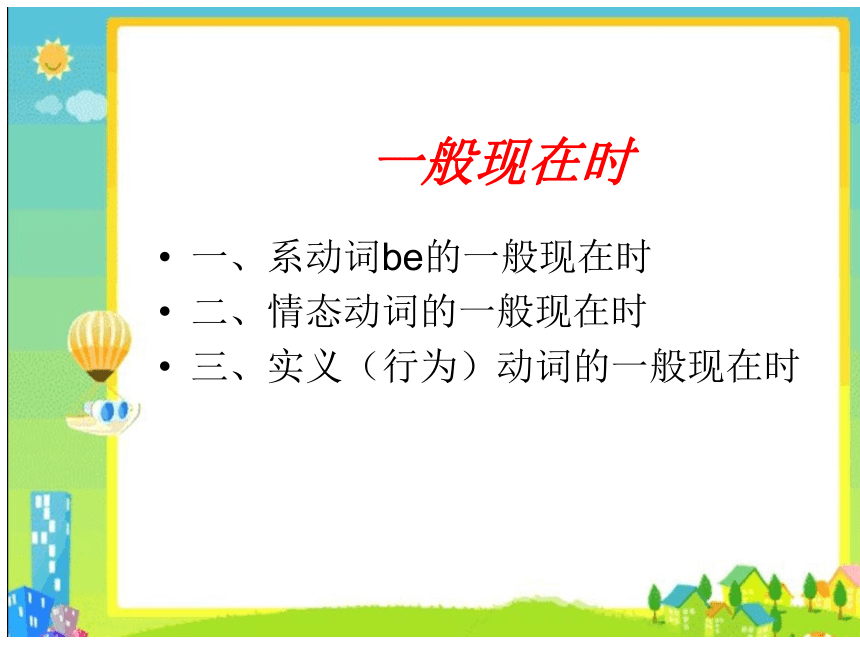 | |
| 格式 | ppt | ||
| 文件大小 | 5.8MB | ||
| 资源类型 | 教案 | ||
| 版本资源 | 通用版 | ||
| 科目 | 英语 | ||
| 更新时间 | 2022-04-15 20:43:56 | ||
图片预览

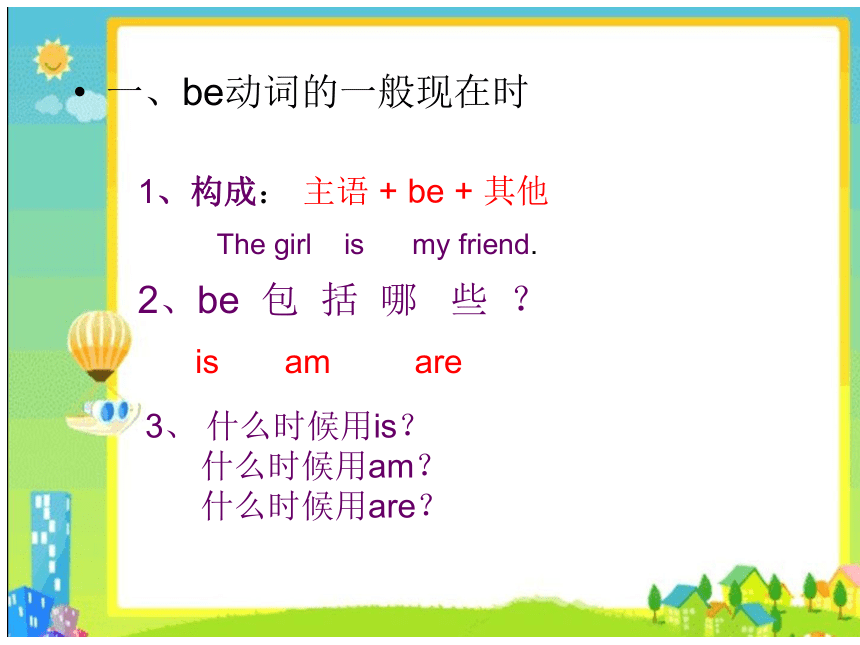
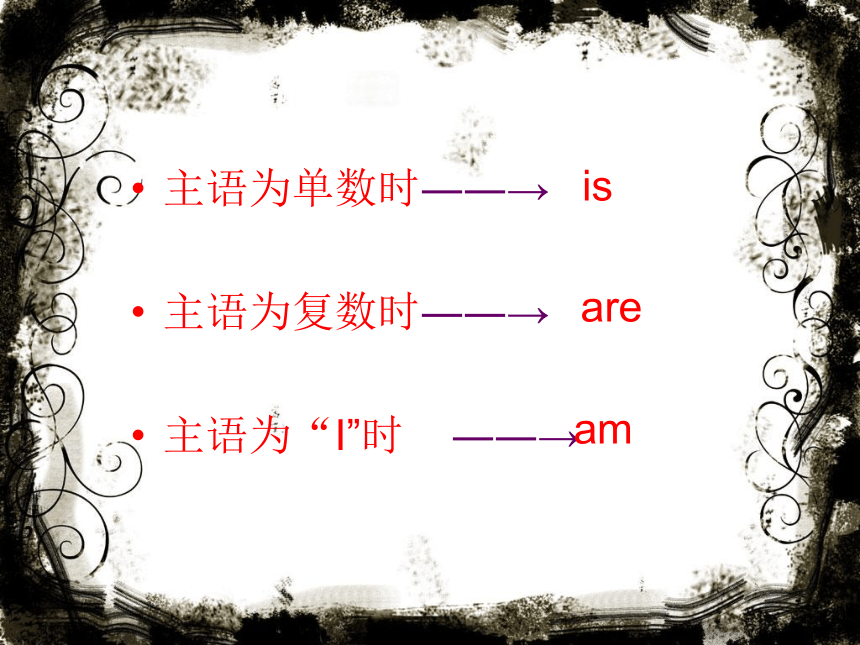
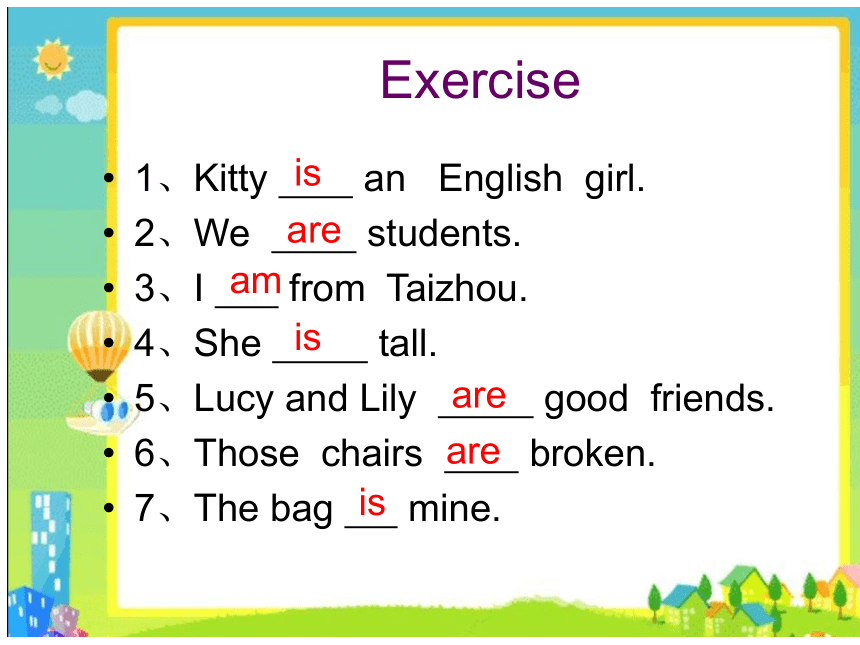
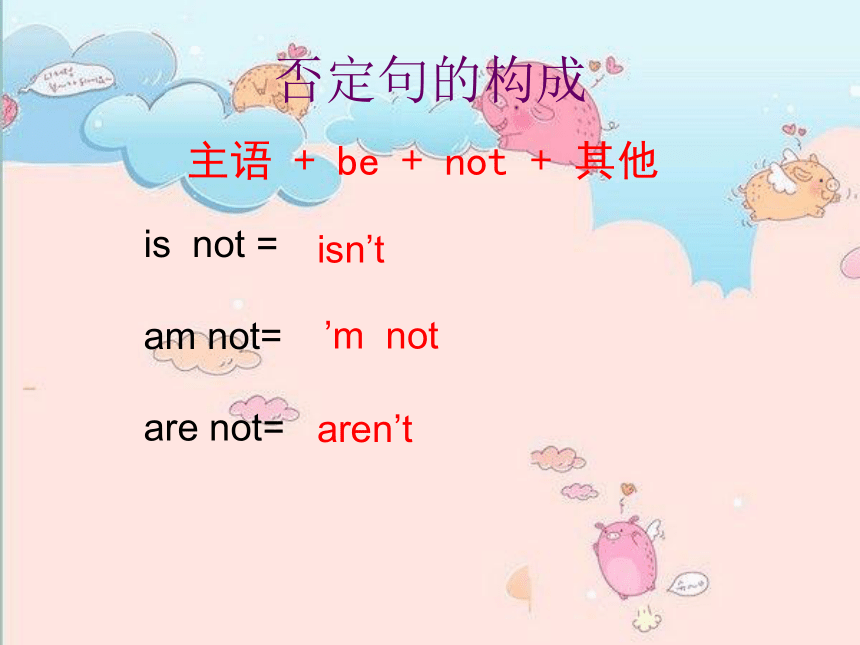
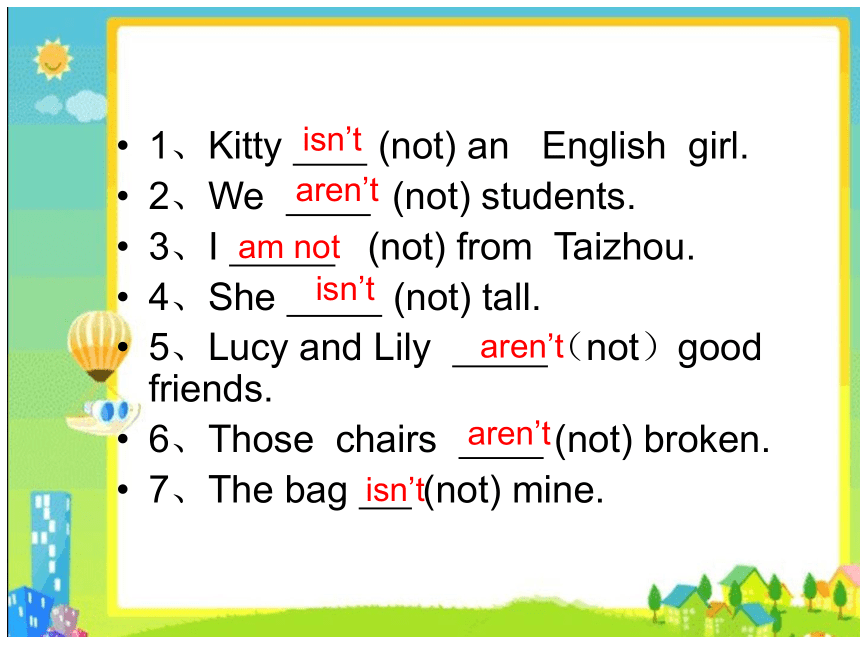
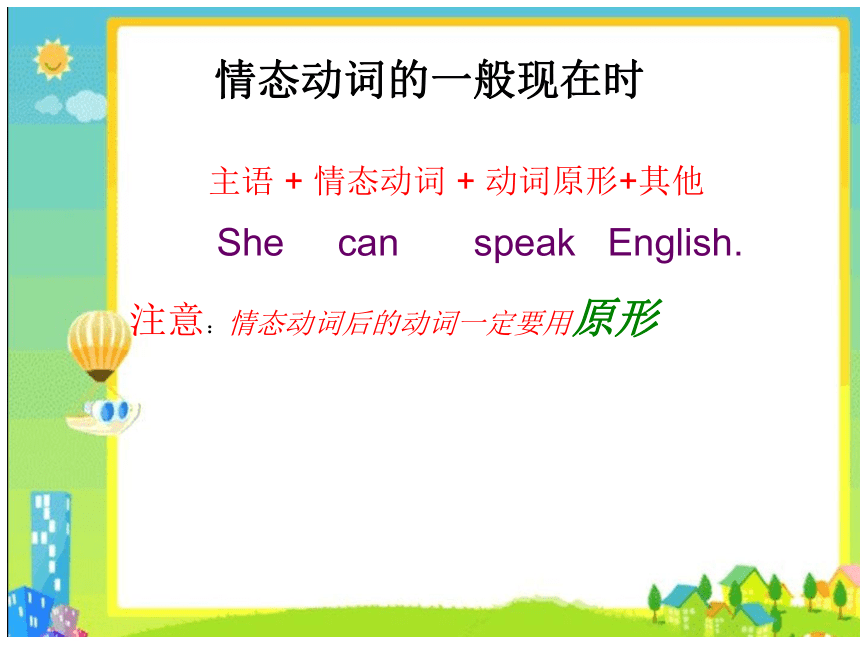
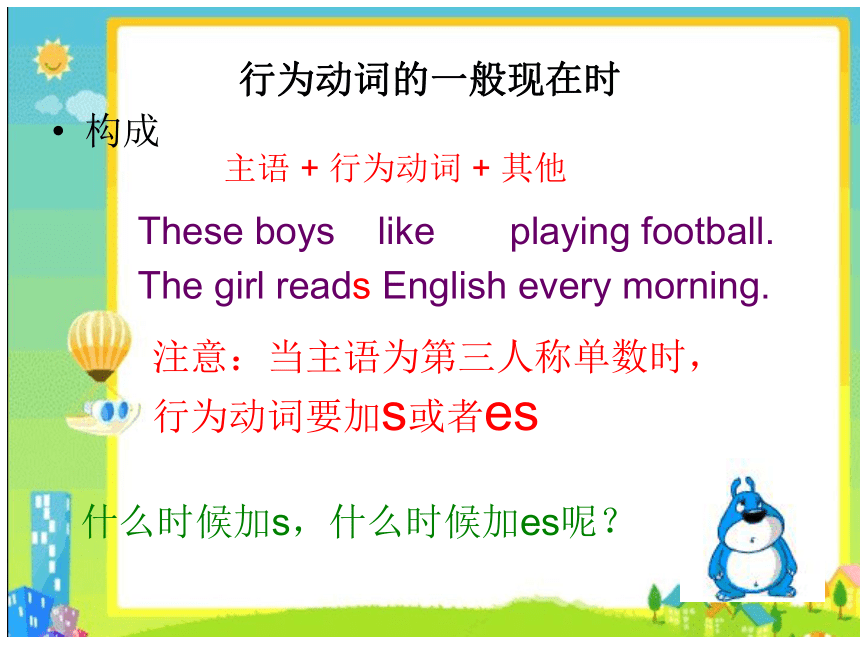
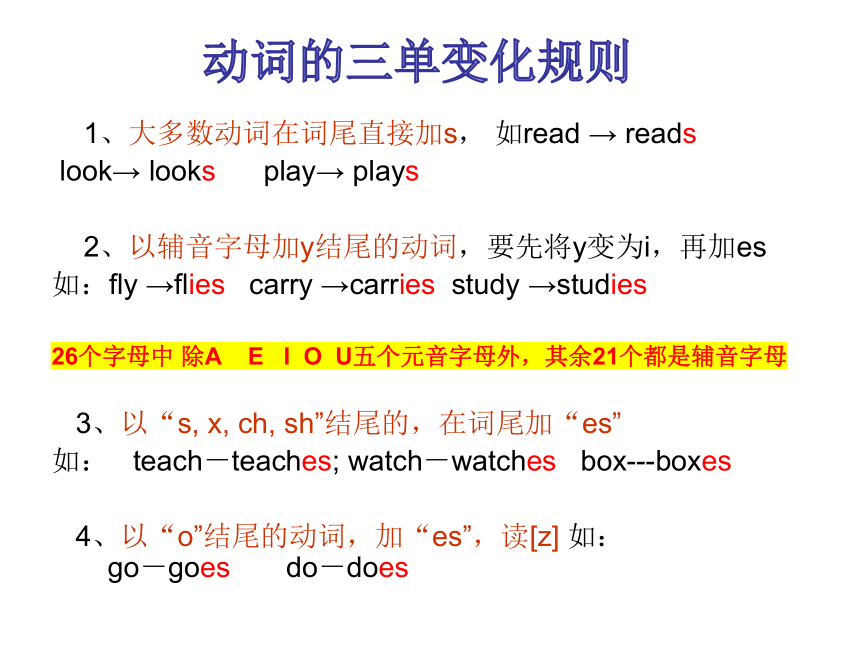
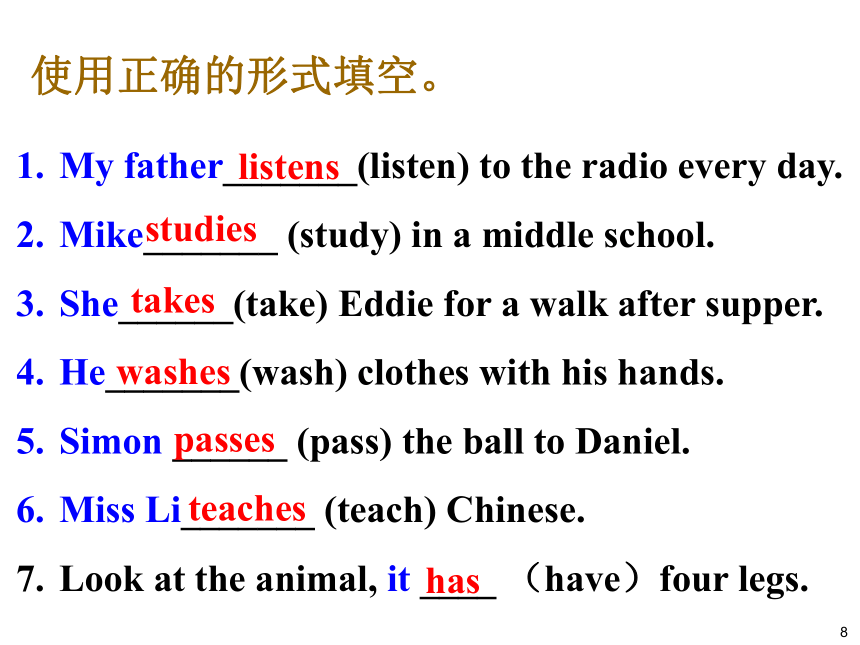
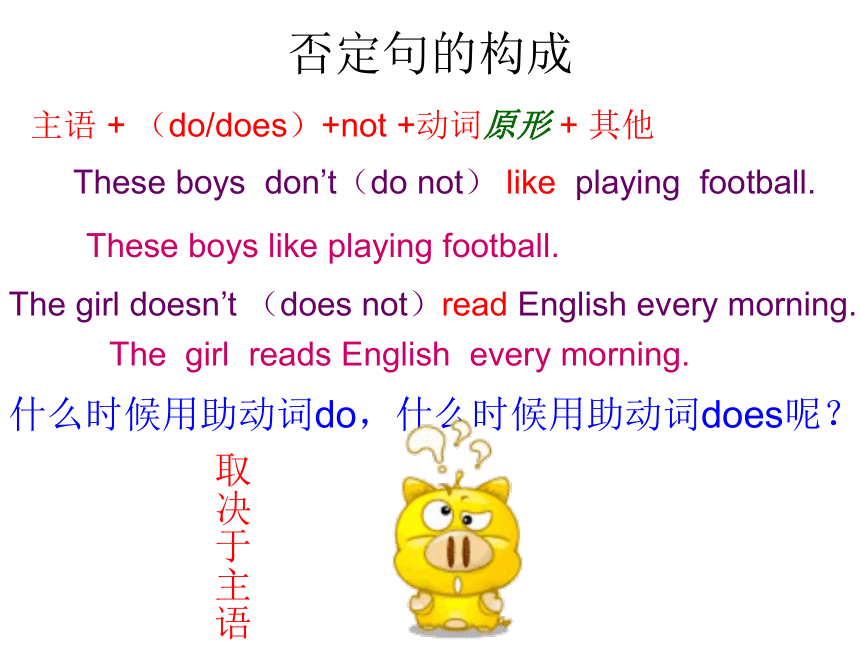
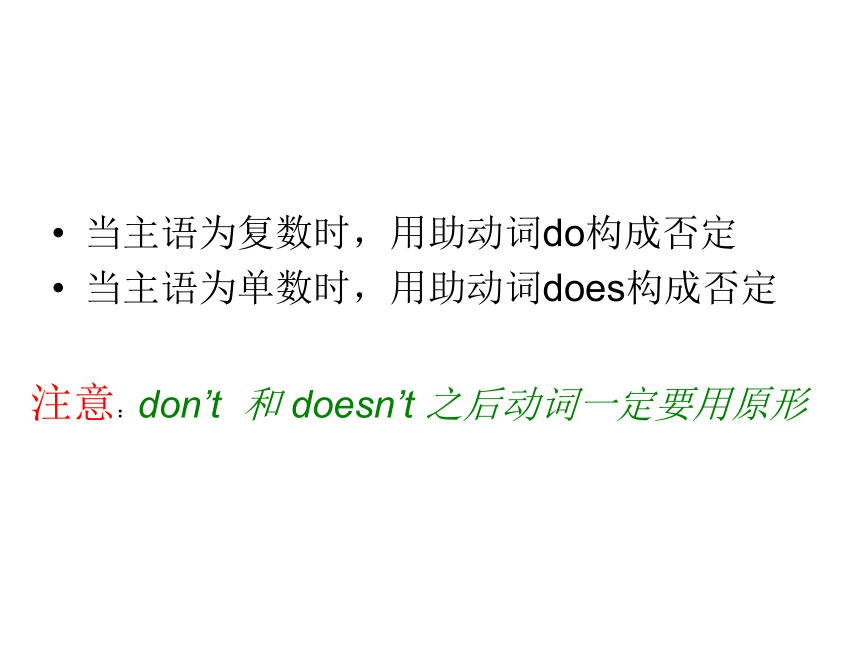
文档简介
(共34张PPT)
一般现在时
一、系动词be的一般现在时
二、情态动词的一般现在时
三、实义(行为)动词的一般现在时
一、be动词的一般现在时
1、构成:
主语 + be + 其他
2、be 包 括 哪 些 ?
is am are
3、 什么时候用is?
什么时候用am?
什么时候用are?
The girl is my friend.
主语为单数时――→
主语为复数时――→
主语为“I”时 ――→
is
are
am
Exercise
1、Kitty an English girl.
2、We students.
3、I from Taizhou.
4、She tall.
5、Lucy and Lily good friends.
6、Those chairs broken.
7、The bag mine.
is
are
am
is
are
are
is
否定句的构成
主语 + be + not + 其他
is not =
am not=
are not=
isn’t
’m not
aren’t
1、Kitty (not) an English girl.
2、We (not) students.
3、I (not) from Taizhou.
4、She (not) tall.
5、Lucy and Lily (not)good friends.
6、Those chairs (not) broken.
7、The bag (not) mine.
isn’t
aren’t
am not
isn’t
aren’t
aren’t
isn’t
情态动词的一般现在时
主语 + 情态动词 + 动词原形+其他
She can speak English.
注意:情态动词后的动词一定要用原形
行为动词的一般现在时
构成
主语 + 行为动词 + 其他
These boys like playing football.
The girl reads English every morning.
注意:当主语为第三人称单数时,
行为动词要加s或者es
什么时候加s,什么时候加es呢?
使用正确的形式填空。
My father_______(listen) to the radio every day.
Mike_______ (study) in a middle school.
She______(take) Eddie for a walk after supper.
He_______(wash) clothes with his hands.
Simon ______ (pass) the ball to Daniel.
Miss Li_______ (teach) Chinese.
Look at the animal, it ____ (have)four legs.
listens
takes
studies
washes
passes
teaches
has
8
否定句的构成
主语 + (do/does)+not +动词原形 + 其他
These boys don’t(do not) like playing football.
The girl doesn’t (does not)read English every morning.
什么时候用助动词do,什么时候用助动词does呢?
取决于主语
The girl reads English every morning.
These boys like playing football.
当主语为复数时,用助动词do构成否定
当主语为单数时,用助动词does构成否定
注意:don’t 和 doesn’t 之后动词一定要用原形
Change the following sentences after the models.
I like red. (green)
They like apples. (oranges)
We take a bus to school every day. (walk to school)
Model 1: I like fish. (meat)
I don’t like meat.
Model 2. He likes reading. (writing)
He doesn’t like writing.
I don’t like green.
They don’t like oranges.
We don’t walk to school every day.
10
4. His brother plays football after school. (play
basketball)
5. It looks like a cat. (hat)
6. She has a dog at home. (a cat)
Model 1: I like fish. (meat)
I don’t like meat.
Model 2. He likes reading. (writing)
He doesn’t like writing.
His brother doesn’t play basketball.
It doesn’t look like a hat.
She doesn’t have a cat at home.
11
Complete the sentences. Use the proper verb forms in brackets
1. Jordan _______(play) basketball.
He ___________(not play) football.
2. I _______(go) swimming on Sunday.
But I___________ (not go) shopping.
3. My cousins _______(enjoy) computer games.
But they __________(not enjoy) ball games.
4. You _______(like) fish.
But he ___________(not like) fish.
plays
doesn’t play
go
don’t go
enjoy
don’t enjoy
like
doesn’t like
12
一般疑问句
一般说来,英语中共有四种问句,分别是:
1、一般疑问句 2、特殊疑问句
3、选择疑问句 4、反意义疑问句
今天我们来学习一般疑问句。那么,什么是一般疑问句呢?我们一起来听听一般疑问句的自白:
“Hello, 大家好!我是一般疑问句,我天生爱发问。我最爱做的事是询问某种情况是否属实,您不对我做出肯定或否定回答我是不会罢休的。您也可用肢体语言来打发我,比如点头或则摇头。所以我有一对好朋友,猜猜是什么?
第一家族:含be动词或情态动词
的一般疑问句
Yes,it is.
No,it isn’t.
1、Is this your English book ?
注意:在回答时,主语要用相应的代词代替
be + 主语 + 其它部分?
肯定回答:Yes,主语+be
否定回答:No,主语+be+not
be
主语
其他
2、Can you speak English
Yes,I can.
No,I can’t.
肯定回答:Yes,主语+情态动词
否定回答:No,主语+情态动词+not
情态动词 + 主语 + 动词原形 + 其它部分?
注意:在回答时,主语要用相应的代词代替
情态动词
主语
动词原形
其他部分
含be或情态动词一般疑问句的改写
秘诀:一调二改三问号 一调:即把句中的be或情态动词调到主语前; 二改:句中的主语I my mine we our ours等第一人称分别改为相应的第2人称you your yours等; 三问号:句末的句号改为问号
I am an English teacher.
→ Are you an English teacher
We can speak English
→ Can you speak English ?
第二家族:行为动词一般疑问句的构成
问句: Do your parents like English? 肯答: Yes,they do. 否答: No,they don’t.
助动词 + 主语 + 动词原形 + 其它?
肯定回答用“Yes, 主语+ do/does.”
否定回答用“No, 主语+do not/does not.”
助动词也常用缩写形式,主要有don’t,doesn’t
特别注意:对于第二家族一定要注意动词的还原
第二家族:
含行为动词(或称为实义动词)一般疑问句的改写
秘诀:一加二改三问号 一加:即在句首加助动词Do或Does; 二改:1、把谓语动词改为原形;
2、改换主语称谓(同第一家组); 三问号:句末的句号改为问号。
We read English every morning.
→ Do you read English every morning
Tom’s father listens to English on
the radio every evening .
→ Does Tom’s father listen to English on the radio every evening
句型转换
1. Mr. Green comes from Shanghai.
(改为一般疑问句)
2. Millie likes English.
(改为否定句)
Does Mr. Green come from Shanghai
Millie doesn’t like English.
3. Daniel enjoys playing computer games.
(改为一般疑问句并做肯定回答)
Does Daniel enjoy playing computer games
Yes, he does.
some、any
一般说来,some 用于肯定句中,any 用于否定句和疑问句中 。
改疑问句或否定句时,原句里的some要改成any
There are some books on the desk. (改为否定句)
→There aren’t any books on the desk.
→Are there any books on the desk
Why not buy some apples
为什么不买些苹果呢
Would you like some more apples
你要不要再吃点苹果
注意:在表示建议或希望得到肯定回答时,
some可用于疑问句,不用变成any.
and or
变否定句时,and要变成or
There is some air and water on the moon .
→ There isn't any air or water on the moon.
He has some brothers and sisters.
→He doesn’t have any brothers or sisters.
The end.
一般现在时
一、系动词be的一般现在时
二、情态动词的一般现在时
三、实义(行为)动词的一般现在时
一、be动词的一般现在时
1、构成:
主语 + be + 其他
2、be 包 括 哪 些 ?
is am are
3、 什么时候用is?
什么时候用am?
什么时候用are?
The girl is my friend.
主语为单数时――→
主语为复数时――→
主语为“I”时 ――→
is
are
am
Exercise
1、Kitty an English girl.
2、We students.
3、I from Taizhou.
4、She tall.
5、Lucy and Lily good friends.
6、Those chairs broken.
7、The bag mine.
is
are
am
is
are
are
is
否定句的构成
主语 + be + not + 其他
is not =
am not=
are not=
isn’t
’m not
aren’t
1、Kitty (not) an English girl.
2、We (not) students.
3、I (not) from Taizhou.
4、She (not) tall.
5、Lucy and Lily (not)good friends.
6、Those chairs (not) broken.
7、The bag (not) mine.
isn’t
aren’t
am not
isn’t
aren’t
aren’t
isn’t
情态动词的一般现在时
主语 + 情态动词 + 动词原形+其他
She can speak English.
注意:情态动词后的动词一定要用原形
行为动词的一般现在时
构成
主语 + 行为动词 + 其他
These boys like playing football.
The girl reads English every morning.
注意:当主语为第三人称单数时,
行为动词要加s或者es
什么时候加s,什么时候加es呢?
使用正确的形式填空。
My father_______(listen) to the radio every day.
Mike_______ (study) in a middle school.
She______(take) Eddie for a walk after supper.
He_______(wash) clothes with his hands.
Simon ______ (pass) the ball to Daniel.
Miss Li_______ (teach) Chinese.
Look at the animal, it ____ (have)four legs.
listens
takes
studies
washes
passes
teaches
has
8
否定句的构成
主语 + (do/does)+not +动词原形 + 其他
These boys don’t(do not) like playing football.
The girl doesn’t (does not)read English every morning.
什么时候用助动词do,什么时候用助动词does呢?
取决于主语
The girl reads English every morning.
These boys like playing football.
当主语为复数时,用助动词do构成否定
当主语为单数时,用助动词does构成否定
注意:don’t 和 doesn’t 之后动词一定要用原形
Change the following sentences after the models.
I like red. (green)
They like apples. (oranges)
We take a bus to school every day. (walk to school)
Model 1: I like fish. (meat)
I don’t like meat.
Model 2. He likes reading. (writing)
He doesn’t like writing.
I don’t like green.
They don’t like oranges.
We don’t walk to school every day.
10
4. His brother plays football after school. (play
basketball)
5. It looks like a cat. (hat)
6. She has a dog at home. (a cat)
Model 1: I like fish. (meat)
I don’t like meat.
Model 2. He likes reading. (writing)
He doesn’t like writing.
His brother doesn’t play basketball.
It doesn’t look like a hat.
She doesn’t have a cat at home.
11
Complete the sentences. Use the proper verb forms in brackets
1. Jordan _______(play) basketball.
He ___________(not play) football.
2. I _______(go) swimming on Sunday.
But I___________ (not go) shopping.
3. My cousins _______(enjoy) computer games.
But they __________(not enjoy) ball games.
4. You _______(like) fish.
But he ___________(not like) fish.
plays
doesn’t play
go
don’t go
enjoy
don’t enjoy
like
doesn’t like
12
一般疑问句
一般说来,英语中共有四种问句,分别是:
1、一般疑问句 2、特殊疑问句
3、选择疑问句 4、反意义疑问句
今天我们来学习一般疑问句。那么,什么是一般疑问句呢?我们一起来听听一般疑问句的自白:
“Hello, 大家好!我是一般疑问句,我天生爱发问。我最爱做的事是询问某种情况是否属实,您不对我做出肯定或否定回答我是不会罢休的。您也可用肢体语言来打发我,比如点头或则摇头。所以我有一对好朋友,猜猜是什么?
第一家族:含be动词或情态动词
的一般疑问句
Yes,it is.
No,it isn’t.
1、Is this your English book ?
注意:在回答时,主语要用相应的代词代替
be + 主语 + 其它部分?
肯定回答:Yes,主语+be
否定回答:No,主语+be+not
be
主语
其他
2、Can you speak English
Yes,I can.
No,I can’t.
肯定回答:Yes,主语+情态动词
否定回答:No,主语+情态动词+not
情态动词 + 主语 + 动词原形 + 其它部分?
注意:在回答时,主语要用相应的代词代替
情态动词
主语
动词原形
其他部分
含be或情态动词一般疑问句的改写
秘诀:一调二改三问号 一调:即把句中的be或情态动词调到主语前; 二改:句中的主语I my mine we our ours等第一人称分别改为相应的第2人称you your yours等; 三问号:句末的句号改为问号
I am an English teacher.
→ Are you an English teacher
We can speak English
→ Can you speak English ?
第二家族:行为动词一般疑问句的构成
问句: Do your parents like English? 肯答: Yes,they do. 否答: No,they don’t.
助动词 + 主语 + 动词原形 + 其它?
肯定回答用“Yes, 主语+ do/does.”
否定回答用“No, 主语+do not/does not.”
助动词也常用缩写形式,主要有don’t,doesn’t
特别注意:对于第二家族一定要注意动词的还原
第二家族:
含行为动词(或称为实义动词)一般疑问句的改写
秘诀:一加二改三问号 一加:即在句首加助动词Do或Does; 二改:1、把谓语动词改为原形;
2、改换主语称谓(同第一家组); 三问号:句末的句号改为问号。
We read English every morning.
→ Do you read English every morning
Tom’s father listens to English on
the radio every evening .
→ Does Tom’s father listen to English on the radio every evening
句型转换
1. Mr. Green comes from Shanghai.
(改为一般疑问句)
2. Millie likes English.
(改为否定句)
Does Mr. Green come from Shanghai
Millie doesn’t like English.
3. Daniel enjoys playing computer games.
(改为一般疑问句并做肯定回答)
Does Daniel enjoy playing computer games
Yes, he does.
some、any
一般说来,some 用于肯定句中,any 用于否定句和疑问句中 。
改疑问句或否定句时,原句里的some要改成any
There are some books on the desk. (改为否定句)
→There aren’t any books on the desk.
→Are there any books on the desk
Why not buy some apples
为什么不买些苹果呢
Would you like some more apples
你要不要再吃点苹果
注意:在表示建议或希望得到肯定回答时,
some可用于疑问句,不用变成any.
and or
变否定句时,and要变成or
There is some air and water on the moon .
→ There isn't any air or water on the moon.
He has some brothers and sisters.
→He doesn’t have any brothers or sisters.
The end.
